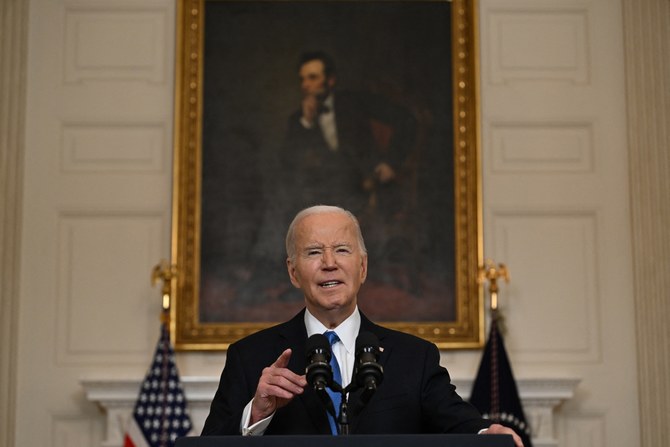
The US military this month initiated a strategic operation consisting of precision airstrikes against specific locations within Iraq and Syria. These actions were conducted in response to a drone strike on a US base in Jordan last month, which resulted in the tragic deaths of three American soldiers.
President Joe Biden’s decision to execute these airstrikes was driven by a compelling necessity to retaliate against the hostile actions perpetrated by Iran-affiliated militias, which have persistently posed a threat to the safety and security of American military personnel in the Middle East. This operation forms part of a broader campaign aimed at deterring and neutralizing such aggressions, thereby safeguarding the interests and well-being of the American forces deployed in the area.
When Biden conveyed his warnings to the pro-Iran militias, there was palpable anticipation among the Iraqi populace of a significant and decisive strike aimed at high-ranking figures, reminiscent of the events of Jan. 3, 2020. During a major incident on that date, which occurred during the administration of former President Donald Trump, Gen. Qassem Soleimani, the commander of Iran’s Quds Force, and Abu Mahdi Al-Muhandis, the Iraqi deputy chief of the pro-Iran Popular Mobilization Units, were assassinated. This historical precedent served as a reference point for many Iraqis, shaping their expectations regarding the potential repercussions of Biden’s warnings to militia factions operating within their borders.
The proponents of the American presence in Iraq greeted with fervent anticipation the elimination of the treacherous militias’ leaders. This sentiment of optimism resonated among those who explicitly supported the US presence, while also extending to a broader coalition of individuals who adamantly reject the presence of these armed groups. Such groups are perceived as terrorist entities, wielding unchecked power outside the purview of the state, thereby usurping the liberties and livelihoods of those who oppose their authority.
The collective yearning for a state free from the grip of these militias encompasses a wide swath of Iraqi society
Dalia Al-Aqidi
Indeed, the collective yearning for a state free from the grip of these militias transcends ideological divides and encompasses a wide swath of Iraqi society. The prevailing sentiment among the Iraqi people is a resounding rejection of a state beholden to the whims of armed factions loyal to Iran. Instead, there is a genuine desire to see the armed forces restored to legitimate state institutions, thereby safeguarding the rights and freedoms of all citizens under the rule of law. Central to this aspiration is the unequivocal demand for the disarmament of these militias and the restoration of authority to government entities.
The majority of the people in Iraq envision a future characterized by the importance of state institutions that are accountable to the citizenry. This collective yearning for a state free from the shackles of militia domination underscores the people’s profound desire for stability, security and prosperity.
Yet, a sense of disillusionment pervaded the populace as the US airstrikes unfolded, revealing themselves to be a notably restrained reaction to the gravest loss of American military personnel in the region in almost three years. This tempered response elicited a palpable sense of dissatisfaction among many citizens, who had hoped for a more robust and decisive intervention in the wake of such a significant loss.
However, amid this disappointment, a tangible yearning persists within Iraqi society for a transformative political paradigm shift so that the country can distance itself from the dominance of political Islamists. This longing is driven by a genuine aspiration to foster a climate conducive to freedom, progress and urban development. Moreover, there is a sincere desire to break free from the shackles of Iranian influence, thereby reclaiming national sovereignty and autonomy.
Embedded within the fabric of Iraqi society is an intrinsic longing for a future characterized by genuine political pluralism, socioeconomic advancement and emancipation from external hegemonic forces, whether that is Iran or the US.
This collective aspiration underscores the deep-seated desire of the Iraqi populace to chart a course toward a more inclusive, prosperous and self-determined future, unencumbered by the constraints of ideological dogma and external interference.
This sentiment was vividly exemplified by the nationwide protests that erupted in October 2019, mainly concentrated in the southern regions of the country, which bore the brunt of pervasive poverty and inadequate public services. Spanning several months, these demonstrations drew the participation of hundreds of thousands of individuals, culminating in a monumental sit-in staged at Tahrir Square in central Baghdad.
This tempered response elicited a sense of dissatisfaction, as many citizens had hoped for a more robust intervention
Dalia Al-Aqidi
Amid this intense display of civic activism, protesters vehemently decried the endemic issues plaguing Iraqi society, including rampant unemployment, infrastructure decay and a lack of democratic principles. Tragically, the noble aspirations of these demonstrators were met with brutal repression at the hands of the pro-Iranian militias. This ruthless crackdown indiscriminately targeted unarmed young protesters, with many falling victim to arbitrary killings, abductions and torture. The violent suppression of dissent not only stifled the voices of those yearning for positive change, but also served as a grim reminder of the formidable obstacles on the path toward genuine reform and democratic governance in Iraq.
Today, observing the discourse prevalent among Iraqis on various social media platforms reveals a notable surge in anger and disappointment toward the US. Many citizens perceive a pervasive narrative of conspiracy unfolding, wherein they feel themselves to be unwitting victims. Central to this narrative is the prevailing belief that Washington and Tehran are engaged in a covert collusion, wherein they wield influence over Iraq at the expense of its sovereignty and national interests.
An increasing number of Iraqis view their country as effectively tethered to Iran’s sphere of influence. The prevailing sentiment is profound frustration and distrust toward external powers, as many feel their nation’s autonomy and agency are being compromised by the geopolitical machinations of more significant, more powerful actors.
History will register a significant turning point, wherein the diminishing hope of extricating Iraq from the grip of Iranian influence and the dominance of its affiliated militias will be attributed to the leadership of the Biden administration. This disillusionment mirrors the sentiments of despair experienced by Afghan citizens following this administration’s handling of affairs in their country. The US’ perceived failure to address these concerns resonates as a profound disappointment.
In the annals of foreign policy, this represents a lamentable addition to the catalog of missteps attributed to the White House. The repercussions of this perceived failure extend beyond the immediate geopolitical sphere, casting a shadow over broader efforts to promote stability, security and self-determination in the Middle East.
Dalia Al-Aqidi is Executive Director at the American Center for Counter Extremism. X: Twitter: @DaliaAlAqidi












